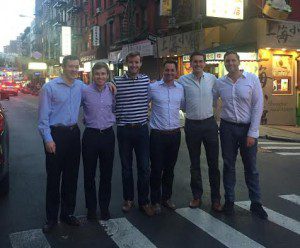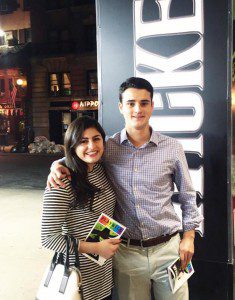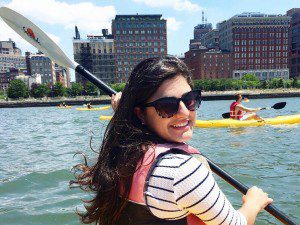Furman meets New York City

With fewer than 3,000 students, Furman is always going to face a climb when it comes to matching the size and influence of other alumni bases, and nowhere is that mountain steeper than New York. Thanks to the efforts of six recent graduates, however, that first bite of the Big Apple won’t be so big for a pair of rising seniors this summer.
In November, Martin Eguiguren ’17 and Sarah Saba ’17 emerged from a rigorous, two-month application and interview process to be named the inaugural recipients of the Furman Metropolitan Fellowship (FMF), a grant program established last year by Jeff Broad ’12, Peter Griffin ’11, Roe Morris ’11, Philip Mabry ’11, Max Dutcher ’12, and Zach Rosen ’11 “to create a bridge between Furman University students and New York City internship connections and community.”

Furman Metropolitan Fellowship team of alumni
All Furman juniors were eligible to apply, and Eguiguren and Saba were selected from a pool of nearly a hundred to receive a stipend that will cover their living expenses as they intern in one of the most intimidating environments in the world. But Rosen says the most valuable part of the relationship can’t be measured with a dollar sign.
“Any scholarship can provide a check, and I think the financial assistance really becomes secondary to the mentorship aspect and the community aspect that (our) group provides to students,” Rosen, the Fellowship’s marketing director, said.
With that in mind, FMF introduced Eguiguren and Saba to Furman alumni in New York while helping them professionally tune their resumes and interview skills as they pursued internships. The assistance culminated with Eguiguren earning a position with Entrepreneurs Roundtable Accelerator, a company that invests in and consults startups, and Saba landing a spot with JDRF, a research organization dedicated to funding type 1 diabetes research.
A piano performance major who is also on the pre-med track, Saba is studying piano under a professor at Juilliard. Both began work in June.
“I’m from Charlotte, so I was considering places like Wake Forest and Vanderbilt and Furman, of course. I wasn’t closed off to the idea of traveling far but I also hadn’t seriously considered New York yet,” Saba, who has only been to New York once, said of her summer research goals before she applied for the FMF. “I definitely would be more hesitant about (New York) just because it would be me alone in a big city trying to figure things out, but I definitely think with the FMF guys and the community that they’ve established up there it will be a very rewarding experience.”
Eguiguren, an economics major born in Boston but raised in Quito, Ecuador, is a natural entrepreneur who launched a business buying used books from other students when he got to Furman.
“You’d be surprised what people are willing to sell their textbooks for when they’re in a hurry and how much more you’ll get paid for them on Amazon in a couple of months,” he said. “It’s really simple.”
Being awarded the grant has already changed his life.

Sarah and Martin enjoy a performance of the musical Wicked
“The start-up scene, that’s what I want to do. This is something for the first time I actually feel very, very excited about,” he said. “They are giving us the means to do it. We did 15 versions of my resume, just making it perfect, just connecting me to the right people and getting to know the scene, understand how it works. Obviously I do still have to do my part, but they’ve been very helpful on their side.”
New York was always Eguiguren’s top option, but he admits that he had trepidation before landing the Fellowship.
“There’s this gap between the amount of talent that is at Furman and the recognition you get for it. And this is just a location thing, this is just a small-school thing, but it’s something we’re struggling with,” he said. “This has already taught me the importance of networking and how to be better at it.”
That’s knowledge the FMF founders earned the hard way. All took New York on individually, and it quickly became apparent that doors opened a lot more easily if you knew someone on the other side.
One problem was there are barely 600 Furman graduates in the city’s metro area. Another is that the other 20.2 million people generally know next to nothing about the University— leading to some creative guesses.
“As a Furman alum you’re up against Ivy League grads and talent from all over the world … There’s a lot of people here, and there’s a lot of competition for every role. It can be cutthroat,” Rosen added. “I think it can feel at times like you are at a disadvantage when you’re from a small liberal arts school, a great liberal arts school, but one that doesn’t have the same kind of name recognition as a Stanford or a Yale or an NYU.”
All six of the Fellowship founders graduated in 2011 or 2012, and their shared Furman experience ended up drawing them together in a place where little else was familiar. Nobody is willing to take credit for the idea, but at some point they realized that the materials to build the infrastructure they wished existed were sitting in the same room.
“At one point a few summers ago, I had been in New York City for just two days when Peter Griffin reached out unexpectedly to offer me the spare bedroom in his East Village apartment,” Rosen said. “I had only been living there for a week when we hosted a barbeque for (Furman internship program director) Susan Zeiger and 30 Furman students on our rooftop, who were in town for a May Experience. It’s these kinds of formative experiences—bringing Furman community together unconditionally—that drove us to formalize and put more energy behind the work we’d already been doing in NYC.”
Rosen said it took about eight weeks to come up with a business plan that was presented to Furman in the spring of 2015.
“From a post-graduation standpoint, we had difficulty leveraging the degree that we all knew was really valuable,” Mabry added. “It just wasn’t as valuable in certain areas that we wanted to go.”
According to Leo Fackler ’03, Furman’s associate director of alumni and parent engagement, in a “really generous sense” there are around 34,000 Furman alumni, and approximately half live in upstate South Carolina or the Atlanta metro area. That doesn’t leave many to go around for the rest of the world, but as the University pushes to strengthen the ties between its graduates, the small number in some ways is an advantage.
“There’s value in a very large alumni base. The difference is in a large alumni base the affinity goes down … whereas with a smaller alumni base the connectivity is I think stronger,” Fackler said. “So if two people went to Furman they have much more of a shared experience, and they’re much more likely to want to help someone.”
Mike Gatchell ’91, Furman’s vice president for Development, says the University is in the midst of a sea change when it comes to alumni giving, and when he was approached with FMF’s idea it was at once pleasant surprise and validation of his office’s shifting focus away from mass mailings and to more personalized interaction with and empowerment of donors.
“Very encouraged was my reaction, because this is something that we had envisioned in an abstract way,” he said. “I give them a lot of credit for more organically launching this . . . It’s where alumni engagement is headed or where we hope it’s headed. We want to facilitate more opportunities for alumni to connect, serve, and give in ways that matter most to them.”
And this project definitely matters to the FMF founders, who have devoted countless hours and more than a little of their own money into altruism as they simultaneously fight to build their own lives and careers. Their enthusiasm was so, well enthusiastic, they even decided to award two grants after planning on only one.
“We made a gut decision at the last minute to expand the program and bring on two fellows,” Rosen said. “It doubles our fundraising goals. It changes a lot of things about the logistics of the program … but I think for us it was a pretty strategic choice to double down.”

Sarah does a little sightseeing via kayak
While the heavy lifting—and all of the money raised—has been done by the New York alumni, Dutcher, the group’s Furman Liason Director, worked with Zeiger and others to make sure everything was done correctly.
“We wanted to make sure we had support and guidance and input from Furman faculty and staff before we completely rolled out the program. We wanted to make sure Furman had a voice in fine-tuning what we wanted to build,” Rosen said. “It takes a lot of coordination with the school to successfully launch an alumni-led fellowship. There were aspects to getting this off the ground where we needed Furman’s expertise.”
“I think they were pleasantly surprised,” Gatchell said. “I think they were thinking they’d have to walk in having to sell us to get approval, and I was more like, ‘let’s get in the sandbox together. How can we help?’”
Mabry says FMF intends to award the grant every year, but early fundraising aims focused on making this summer happen first. Now attention turns toward the future and potential endowment.
“The goals are to try to get as much interest, whether it be financially or other involvement, from young alumni (as possible). A lot of us think it would be really cool to have this largely bootstrapped and run by people our age,” he said. “Ideally this would be somewhat self-sustaining.”
And despite the work, if anything FMF is only thinking bigger for the future.
“I think as the Furman community starts to learn more about it and as the New York community starts to really come on board with it and get involved and as donations start to ramp up, we’d like to continue to increase the number of students we bring on board,” Rosen said. “Two per year is by no means the max. It’s a starting point. The reason we called this the Furman Metropolitan Fellowship is we didn’t want to limit this to New York City—San Francisco, Chicago, London, Los Angeles—I think this can be something that develops into a program where there are active alumni and active advisors in every city.”
Eguiguren and Saba are ready to sign up now.
“Hopefully me and Sarah will become a part of the program itself when we graduate and sort of foster that through Furman and expand it in a way that when students get to New York they have the connections, they have the name,” Eguigeren said. “Most of all I’m just excited about the future. Five years from now, what can I give back to the program?”
For more information on the Furman Metropolitan Fellowship or to get involved, visit the Furman Metropolitan Fellowship website..